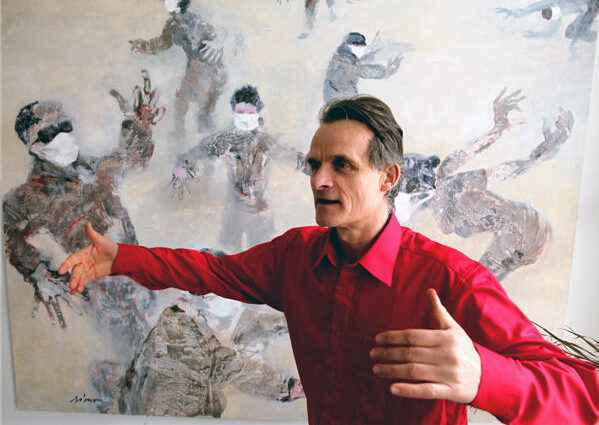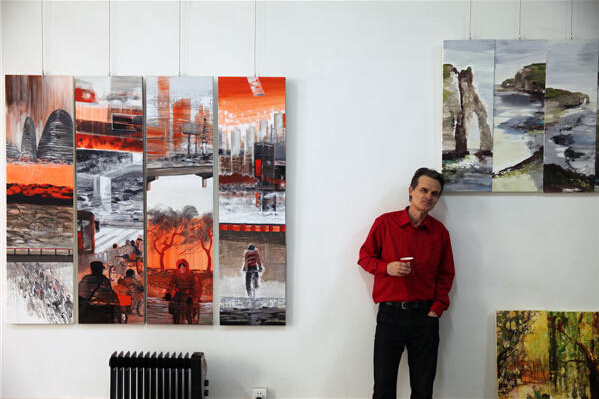
Jean Yves Simon in front of his painting Lost at his studio in Heiqiao, an art village in Beijing.
"He always brings his sketchbooks. When he finds something interesting, he sits on the ground and writes for hours. My daughter and I are never in the same group with him," says his wife, Huang Li.
Born in a country famous for oil paintings, it's natural for Simon to focus more on ordinary people than on landscapes.
During his trip to Taishan Mountain, Simon painted cleaners, stick men and workers paving roads on the mountain. Many of them were confused, telling the painter that they were not interesting and that he should draw charming ladies instead of ordinary people like them.
"I told them they were interesting for me and they felt confused. However, they were very happy to take a photo of their portraits with their mobile phone when I finished my sketches," Simon says. He has published several sketchbooks on China.
For Simon, traveling, like painting, is part of his life. He started painting when he traveled during his childhood, which was encouraged by his father. His father took him and his sister to forests, farmlands and the Sahara desert to paint.
Simon has himself been to the Sahara desert a dozen times, to India three times and has stayed in many countries for years, including the United Kingdom and Portugal. He has lived in Beijing since 2012 and will "stay as long as necessary".

Jean Yves Simon in front of his painting Lost at his studio in Heiqiao, an art village in Beijing.
"Beijing is a changing city - I love change. Just see the number of shows held every day here. It's impossible for this to happen in France," says Simon.
The French artist quickly acquainted himself with Chinese painters and sculptors in the art village where his studio is located, and discusses China's culture and art world with them. He rides his bicycle to hutong and parks to integrate himself into Beijing life. He cycled about 4,000 kilometers last year.
In Simon's view, the crowds of people and the traffic in the city are charming and fluid like water, full of energy, as opposed to the "dullness of life in France". The city life, crowds, skyscrapers, hutong and local people stand out on his canvas, often with a red hue because he thinks red is the color of Beijing.
Huang, his wife, says that Simon had asked her to buy a red shirt and a pair of red shoes for him when he decided to stay in Beijing.
"I try to understand the culture with my eyes, ears and mouth. I love to talk to people and listen to the language even though I don't understand. I feel I'm a half Chinese now," Simon says.
We Recommend:
